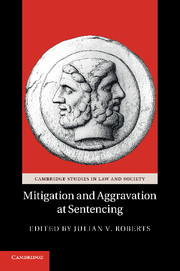Book contents
- Frontmatter
- Contents
- Tables
- Contributors
- Foreword
- Acknowledgments
- Chapter one Punishing, more or less
- Chapter two Re-Evaluating the Justifications for Aggravation and Mitigation at Sentencing
- Chapter three The Search for Principles of Mitigation
- Chapter Four Personal Mitigation and Assumptions about Offending and Desistance
- Chapter Five Intoxication as a sentencing factor
- Chapter Six Beyond the Partial Excuse
- Chapter Seven Equality before the law
- Chapter Eight Personal mitigation
- Chapter Nine Exploring Public Attitudes to Sentencing Factors in England and Wales
- Chapter Ten The Pernicious Impact of Perceived Public Opinion on Sentencing
- Chapter Eleven Addressing Problematic Sentencing Factors in the Development of Guidelines
- Chapter Twelve Proof of Aggravating and Mitigating Facts at Sentencing
- Chapter Thirteen Mitigation in Federal Sentencing in the United States
- Chapter Fourteen The discretionary effect of mitigating and aggravating factors
- Index
- References
Chapter Eight - Personal mitigation
An Empirical Analysis in England and Wales
Published online by Cambridge University Press: 07 September 2011
- Frontmatter
- Contents
- Tables
- Contributors
- Foreword
- Acknowledgments
- Chapter one Punishing, more or less
- Chapter two Re-Evaluating the Justifications for Aggravation and Mitigation at Sentencing
- Chapter three The Search for Principles of Mitigation
- Chapter Four Personal Mitigation and Assumptions about Offending and Desistance
- Chapter Five Intoxication as a sentencing factor
- Chapter Six Beyond the Partial Excuse
- Chapter Seven Equality before the law
- Chapter Eight Personal mitigation
- Chapter Nine Exploring Public Attitudes to Sentencing Factors in England and Wales
- Chapter Ten The Pernicious Impact of Perceived Public Opinion on Sentencing
- Chapter Eleven Addressing Problematic Sentencing Factors in the Development of Guidelines
- Chapter Twelve Proof of Aggravating and Mitigating Facts at Sentencing
- Chapter Thirteen Mitigation in Federal Sentencing in the United States
- Chapter Fourteen The discretionary effect of mitigating and aggravating factors
- Index
- References
Summary
Personal mitigation casts into sharp focus some fundamental issues about sentencing principles and judicial discretion. Is justice best served by sentencing the offence or the offender? What balance ought to be struck between the two? Surprisingly, mitigation has been an under-researched topic, despite its evident significance in the sentencing process and the contentious issues it raises (Ashworth 2010: 168–94). Previously, the only detailed empirical study that specifically focused on the role of mitigation in the English criminal courts was that of Shapland (1981), who examined the mitigation deployed in the sentencing of one hundred adult defendants in magistrates’ courts and the Crown Court. Other empirical studies of sentencing that have explored mitigation include Flood-Page and Mackie (1998) (on sentencing practice in magistrates’ courts and the Crown Court), Hedderman and Gelsthorpe (1997) (on the sentencing of female defendants by magistrates) and Parker et al. (1989) (on the sentencing of young offenders by magistrates).
CHAPTER OVERVIEW
In this chapter we present key findings of an empirical study conducted in England and Wales which addressed the following two questions:
What is the role of personal mitigation in sentencing decisions made in the English criminal courts?
What are the main components of personal mitigation?
- Type
- Chapter
- Information
- Mitigation and Aggravation at Sentencing , pp. 146 - 167Publisher: Cambridge University PressPrint publication year: 2011
References
- 21
- Cited by

